
NEUROREHABILITATION
Scope & Guideline
Elevating clinical standards through rigorous neurorehabilitation studies.
Introduction
Aims and Scopes
- Neurorehabilitation Techniques and Technologies:
The journal emphasizes research on various rehabilitation techniques, including robotic-assisted therapies, virtual reality, and non-invasive brain stimulation, aimed at improving motor function and cognitive abilities in patients. - Patient-Centered Approaches:
Research published often explores patient and caregiver perspectives, highlighting the importance of individualized care and the psychological aspects of rehabilitation. - Multidisciplinary Collaboration:
The journal promotes studies that involve interdisciplinary teams, integrating insights from neurology, psychology, physical therapy, and occupational therapy to enhance rehabilitation outcomes. - Outcome Measures and Assessment Tools:
There is a consistent focus on developing and validating tools for assessing rehabilitation outcomes, including functional independence, quality of life, and specific rehabilitation goals. - Innovative Rehabilitation Models:
The journal includes research on novel rehabilitation models, such as community-based programs and telehealth interventions, which aim to expand access to care and improve patient outcomes.
Trending and Emerging
- Robotic and Technological Interventions:
There is a significant increase in research on robotic-assisted rehabilitation and technology-driven interventions, such as exoskeletons and virtual reality, demonstrating their effectiveness in enhancing motor recovery. - Telehealth and Remote Rehabilitation:
The COVID-19 pandemic has accelerated interest in telehealth solutions, with a growing number of studies exploring their feasibility and effectiveness for delivering rehabilitation services remotely. - Holistic and Multimodal Approaches:
Emerging themes emphasize the importance of combining various therapeutic modalities, including physical therapy, cognitive training, and psychological support, to address the multifaceted needs of patients. - Focus on Quality of Life and Patient-Centric Outcomes:
Recent studies prioritize quality of life measures and patient-reported outcomes, reflecting a shift towards understanding the broader impacts of rehabilitation beyond just physical recovery. - Cognitive Rehabilitation and Neuroplasticity:
Research increasingly focuses on cognitive rehabilitation strategies and the underlying mechanisms of neuroplasticity, aiming to enhance cognitive recovery in patients with brain injuries or strokes.
Declining or Waning
- Traditional Pharmacological Interventions:
There has been a noticeable decrease in studies focusing solely on pharmacological treatments for neurological rehabilitation, as the field shifts towards more integrative approaches combining therapy and technology. - Generalized Neuropsychological Assessments:
While neuropsychological assessments remain important, there has been a decline in studies focused on broad, generalized assessment tools, with a greater emphasis now on specific, targeted assessments tailored to individual patient needs. - Single-Disciplinary Studies:
Research that focuses solely on a single discipline within neurorehabilitation is becoming less common. There is a trend towards interdisciplinary studies that combine multiple perspectives and methodologies.
Similar Journals
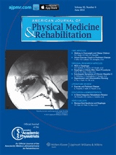
AMERICAN JOURNAL OF PHYSICAL MEDICINE & REHABILITATION
Elevating Standards in Physical Medicine and RehabilitationAmerican Journal of Physical Medicine & Rehabilitation, published by Lippincott Williams & Wilkins, is a leading journal in the field of rehabilitation, dedicated to advancing knowledge in physical medicine and rehabilitation practices. With an established history from 1988 to 2024, this journal serves as a vital resource for clinicians, researchers, and students interested in the multifaceted aspects of rehabilitation science. It holds a commendable Q2 ranking in the Physical Therapy and Sports Therapy fields and a prestigious Q1 position in Rehabilitation, reflecting its impact and relevance in the academic community. The journal's Scopus rankings further highlight its significance, placing it among the top percentile for both rehabilitation medicine and physical therapy. Although it does not currently offer open access options, its accessibility through institutional subscriptions ensures widespread reach. By publishing high-quality research, clinical studies, and reviews, the American Journal of Physical Medicine & Rehabilitation plays a critical role in shaping contemporary rehabilitation practices and improving patient outcomes.

Brain Circulation
Unlocking the Mysteries of Brain CirculationBrain Circulation, published by Wolters Kluwer Medknow Publications, is a premier open-access journal dedicated to advancing knowledge and research in the field of neurovascular health and brain circulation. Since its inception in 2015, this journal has played a pivotal role in disseminating high-quality research articles, reviews, and case studies that explore the intricate relationship between cerebrovascular dynamics and neurological disorders. The journal is committed to fostering a collaborative environment for global researchers, healthcare professionals, and students, aiming to improve outcomes in neuroprotection and treatment strategies. Although it does not currently have an H-index listed, its focus on innovative research ensures its growing significance within the academic community. With a user-friendly open-access model, Brain Circulation invites contributions that enhance understanding and reshape practices in neurovascular care, making it an essential resource for those dedicated to unraveling the complexities of brain health.

Archives of Rehabilitation Research and Clinical Translation
Unlocking Potential: Research That Transforms RehabilitationArchives of Rehabilitation Research and Clinical Translation, published by ELSEVIER, is a leading open access journal dedicated to advancing the field of rehabilitation research and clinical practice. Since its inception in 2019, the journal has made significant contributions to the understanding of rehabilitation methodologies and interventions, showcasing innovative research that bridges the gap between clinical practices and rehabilitation science. With an impressive impact factor and essential Scopus rankings—#56 in Rehabilitation Medicine and #94 in Physical Therapy—this journal is highly regarded in its fields and reaches a diverse international audience. The open access format promotes widespread dissemination of scholarly work, ensuring that vital research findings are accessible to all practitioners, researchers, and students worldwide. As a trusted platform for high-quality research, the journal encourages rigorous scientific exploration and fosters collaboration among professionals striving to improve the quality of rehabilitation services.
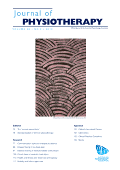
Journal of Physiotherapy
Championing Best Practices in Physiotherapy and RehabilitationThe Journal of Physiotherapy, published by the Australian Physiotherapy Association, is a leading peer-reviewed journal dedicated to advancing the field of physical therapy, sports therapy, and rehabilitation. With a stellar impact factor and ranked Q1 in the 2023 category of Physical Therapy, this journal serves as an essential resource for researchers, clinicians, and educators alike. Located in Australia, it features open access options that allow global dissemination of knowledge, enhancing the visibility of cutting-edge research from 2010 to 2024. With a commendable Scopus Rank of #5 out of 247 in its field, achieving the 98th percentile, the Journal of Physiotherapy is committed to enriching the evidence base within the profession and promoting best practices in physiotherapy. Whether you are searching for the latest clinical studies, innovative treatments, or comprehensive reviews, this journal provides a platform for high-quality scholarship that drives the profession forward.
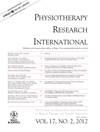
Physiotherapy Research International
Innovating Physiotherapy for Better Patient Outcomes.Physiotherapy Research International is a leading journal in the fields of Physical Therapy, Sports Therapy, and Rehabilitation, published by WILEY. With a commendable impact factor reflecting its significant contribution to the profession, this journal enjoys a competitive position, ranking in the 66th percentile and 84th out of 247 in its category according to Scopus. The journal encompasses a broad scope of research from 1996 to 2024, addressing critical advancements in physiotherapy and rehabilitation practices. Although it is not an Open Access journal, it provides valuable insights and research findings that foster knowledge and innovation among practitioners and researchers alike. As a Q2 category journal in its field for 2023, Physiotherapy Research International aims to facilitate the dissemination of high-quality research aimed at improving patient outcomes and guiding clinical practice. It serves as an essential resource for those committed to advancing the science and practice of physiotherapy.

Balneo and PRM Research Journal
Connecting global minds in balneotherapy and rehabilitation.Balneo and PRM Research Journal, an esteemed publication of the Romanian Association of Balneology, serves as a valuable forum for the dissemination of innovative research in the fields of physical therapy, sports therapy, rehabilitation, and the medical management of rheumatic conditions. With its commitment to Open Access principles since 2011, the journal ensures that groundbreaking findings are accessible to a global audience, promoting collaboration and advancing knowledge within the academic community. Despite its emerging status, as reflected in its Scopus rankings—with Physical Therapy, Sports Therapy and Rehabilitation ranked at the 25th percentile, and Rheumatology at the 21st percentile—the journal is positioned to make significant contributions to clinical practice and research. The journal is published in the heart of Romania, at Bucharest, and operates from 2021 to 2024, focusing on the intersection of balneotherapy and modern rehabilitation techniques. As a crucial resource for researchers, professionals, and students alike, Balneo and PRM Research Journal invites submissions that explore the latest advancements and clinical applications in these vital areas of health sciences.
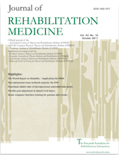
JOURNAL OF REHABILITATION MEDICINE
Empowering Recovery with Groundbreaking InsightsJOURNAL OF REHABILITATION MEDICINE, published by the FOUNDATION REHABILITATION INFORMATION in Sweden, stands as a leading platform for the dissemination of groundbreaking research in the field of rehabilitation. With an impact factor that places it in the Q1 category for Physical Therapy and Rehabilitation and a noteworthy Q2 ranking in Sports Science and Medicine (miscellaneous), this journal serves as an essential resource for researchers, clinicians, and students dedicated to improving patient care and rehabilitation outcomes. As an Open Access publication since 2001, it ensures that knowledge is widely accessible, promoting collaborative efforts across the global rehabilitation community. Aiming to bridge the gap between research and clinical practice, the journal covers a comprehensive range of topics, providing a vital forum for innovative studies that advance the understanding and effectiveness of rehabilitation therapies. As it approaches its convergence into 2024, the JOURNAL OF REHABILITATION MEDICINE continues to be a cornerstone for all those committed to advancing rehabilitation sciences.

ACTA NEUROLOGICA BELGICA
Advancing Neurological Frontiers, One Article at a Time.ACTA NEUROLOGICA BELGICA is a leading academic journal published by Springer Heidelberg, dedicated to advancing the field of neurology and medicine. With an ISSN of 0300-9009 and E-ISSN 2240-2993, this journal has been a vital resource since its inception, contributing significantly to neurological research and clinical practice. It holds a respectable impact factor with categories spanning from Q2 in Medicine (miscellaneous) to Q3 in Neurology (clinical) as of 2023, indicating its prominence in the scientific community. The journal's extensive coverage since 1959 enhances its historical relevance, while its ongoing publication until 2024 ensures the latest developments are readily accessible. Researchers and practitioners can benefit from its rigorous peer-reviewed articles, which are crucial for staying current in this rapidly evolving discipline. As a scholarly platform, ACTA NEUROLOGICA BELGICA plays a pivotal role in disseminating knowledge and fostering innovation in neurology, making it a must-read for professionals, students, and anyone involved in the field.
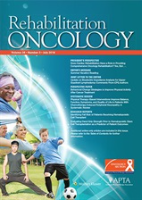
Rehabilitation Oncology
Transforming Cancer Care with Interdisciplinary InsightsRehabilitation Oncology, published by Lippincott Williams & Wilkins, is an essential academic journal dedicated to the interdisciplinary field of cancer rehabilitation. Since its inception in 2008, it has provided a platform for illuminating research, clinical practices, and innovative therapies aimed at improving the quality of life for cancer survivors. With an ISSN of 2168-3808 and an E-ISSN of 2381-2427, the journal covers a wide spectrum of topics, making significant contributions across various categories including Oncology, Rehabilitation, and Physical Therapy. Although currently not Open Access, the journal has garnered a notable 2023 Impact Factor status, placing it in the Q3 quadrant across multiple relevant disciplines as per the latest Scopus rankings. This reflects its growing influence in the rehabilitation community and offers vital insights for practitioners and researchers seeking to advance their understanding of patient care post-cancer treatment. With its focus on bridging the gap between research and real-world application, Rehabilitation Oncology serves as a vital resource for healthcare professionals committed to enhancing recovery outcomes in their patients.

Journal of Neurorestoratology
Fostering breakthroughs in neuroscience and rehabilitation.The Journal of Neurorestoratology, published by TSINGHUA UNIV PRESS, stands as a pivotal resource in the evolving fields of neuroscience and rehabilitation. With focus areas encompassing cognitive neuroscience and neurological disorders, this Open Access journal, launched in 2013, fosters unimpeded global access to cutting-edge research and breakthroughs in neuro-restorative techniques and therapies. Although it is relatively new, it has demonstrated its potential impact within the academic community, ranking in the 51st percentile for Medicine _ Rehabilitation and contributing novel insights in the realms of speech and hearing, neurology, and cognitive neuroscience. With its commitment to disseminating innovative findings and promoting interdisciplinary collaboration, the Journal of Neurorestoratology plays a crucial role in advancing our understanding and management of neuro-rehabilitation, making it a valuable platform for researchers, healthcare professionals, and students alike.